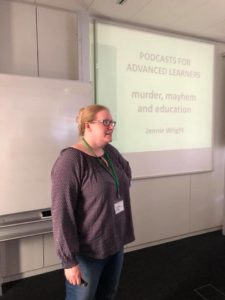Jennie Wright – using podcasts in the classroom: murder, mayhem and education on 23rd April 2018
Review by Valeria Koppelhuber
 On a warm, sunny afternoon Jenni shared her enthusiasm and awakened our interest in using podcasts in listening lessons for advanced students. Contrary to the title of the workshop, murder and education are not negative. As we realized how time-saving podcasts are in preparing lessons and that they even induce autonomous learning among students, we were ready for details.
On a warm, sunny afternoon Jenni shared her enthusiasm and awakened our interest in using podcasts in listening lessons for advanced students. Contrary to the title of the workshop, murder and education are not negative. As we realized how time-saving podcasts are in preparing lessons and that they even induce autonomous learning among students, we were ready for details.
Jennie informed us how she used the podcast “Serial” https://serialpodcast.org for a 6 week project. It was enlightening to hear that students voluntarily looked for more material on the topic. The podcast on investigative journalism in the death of an American high school student in 1999 aroused interest in the listeners, as it was a real event.
Jennie generously provided us with material on strategic listening tasks that result in active learner participation. Learners can already be challenged by finding their own listening strategy, e.g. with an audio material in their own language. Simply closing their eyes and concentrating on spoken words can be a difficult task depending on the length of time. Then they start note-taking on the people involved in the podcast, determining the timeline, events and creating a profile of the protagonists.
We realized that even note-taking is a skill that needs to be developed and practiced while listening. Using Jennie’s ideas on finding syllables, abbreviations and especially doodling can save time and effort, allowing more concentration on spoken words. Needless to say, symbols, sketched figures also eliminate worries of spelling and may support memory and communication possibilities. Learners are eager to compare information gained with that of fellow classmates.
Furthermore, we experienced that video podcasts that have headings, sub-headings and photos justify listening strategically. Learners become more attentive to and selective in the information they wish or need to hear and retain.
In another task Jennie provided, we picked up ideas on how to deal with processes. Students pre-teach themselves by creating word clouds on topics, e.g. How does a court case work in America? Or Who or what is involved in the process? (evidence, fingerprints, jury, police, attorneys, etc.) Then they listen specifically for requested information. This requested information can be determined by the learners themselves.
Regarding language, the listening strategy can be focused on language, e.g. specifically nouns, verbs, adjectives. Grammar is called for when making predictions or stating facts or vocabulary in statements emphasizing the truth.
Pronunciation can play a very special role in listening strategies. Concentration on pronunciation can help analyze a person’s voice, accent or emotions. These may give more information on predictions, conviction, confidence or even the trustworthiness of a speaker. In the podcast “Serial”, analyzing the voice can even lead to deciding on the character’s innocence or guilt.
Another task on culture can fill lessons. The topic can involve searching for school activities that may promote pride and confidence, e.g. the honor rolls or homecoming events that may even lead to competition or jealousy. Here again grammar and language aspects may be called upon: the comparison of adjectives, adjective vs. adverbs.
Another task may involve what Jennie called Bonus Resources. These can be specific transcripts, e.g. an affidavit, further pieces of evidence or an interview between two witnesses.
Furthermore, Jennie mentioned overreaching tasks. These may require that the learner write a journal with the viewpoint of a family member or lawyer. A speaking activity may deal with learners in a court case; the creation of a timeline, events and names or profiling people. Jennie recommended watching “Making a murderer”.
There seemed to be no end in using podcasts for listening. Last but not least, Jennie rewarded us with tips for working with podcasts:
1) Reduce the speed if necessary (depending on learner level or in mixed groups).
2) Download transcripts when available.
3) Take advantage of ‘Best Podcasts’ lists.
4) Google ‘Best Podcasts’ list; e.g.production, logistics, software development.
5) Find podcasts relating to the learners’ interests = make the lessons generic.
6) Listen to learners’ podcasts.
The time we spent with Jennie was worthwhile. She left us with thoroughly positive impressions of podcasts, regardless of the topic. We are invited to refer to
http://teflhelperblog.wordpress.com or contact her at .

